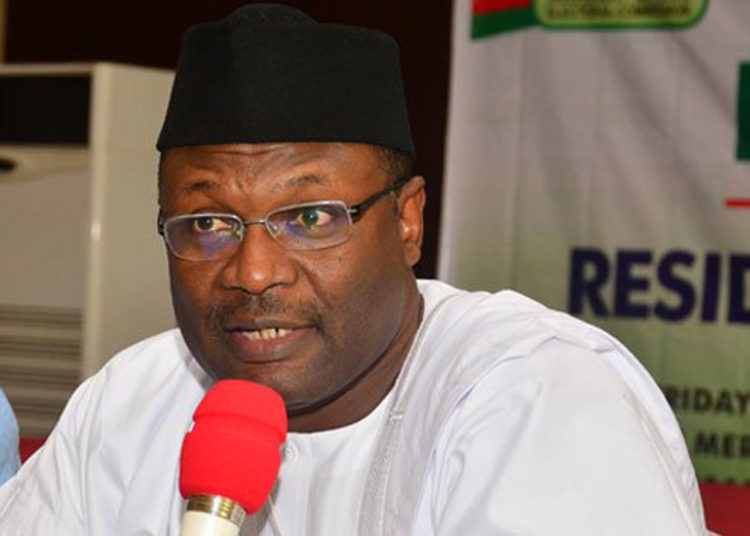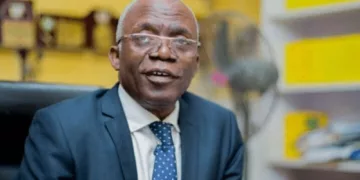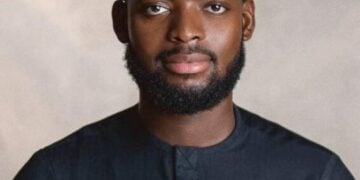As political parties and their candidates prepare to commence campaigns for different offices later this month, a survey by LEADERSHIP has shown that an overwhelming majority of Nigerians want to vote candidates that can tackle the problems of insecurity, economic hardship and education among others head-on.
The survey by LEADERSHIP Data Mining Department to gauge the perception of Nigerians towards the 2023 elections revealed that Nigerians want to vote leaders that are credible, competent, and that party, religious and ethnic affiliations may not have much influence on their voting pattern in 2023 elections.
The survey was conducted between August 1 and 31, 2022. Tools deployed to gather data and information for this survey include: Google forms (created and deployed by LEADERSHIP Data Mining Department), opinion poll (used in gathering more information via leadership.ng) and interviews.
In the survey, 61.5% of the respondents from states which include Federal Capital Territory, Kano, Kaduna, Zamfara, Oyo, Niger, Nasarawa, Lagos, Kogi, Kebbi, Adamawa, Bauchi, Benue, Borno, Gombe, and Jigawa, among others, said they will only vote for competent leaders.
Ten percent of the respondents said religious sentiments will inform their voting pattern, 9.2% plan to vote based on party affiliation while 4% said ethnicity will determine who they will vote for.
A majority of the respondents want the incoming political leaders, irrespective of their parties, to tackle the escalating insecurity in Nigeria, the economic hardship in the country and decadence in the education sector. Other things they want the incoming government to tackle are: unemployment, poverty, hunger, heath, corruption, erratic electricity, and bad roads, among others.
In the survey, 86% of the respondents said they had registered and had their permanent voter’s cards (PVCs) while 31.2% do not have PVC.
The survey (data, poll and interviews) gathered information across Nigeria; however, it has a 2.9 percent margin of error.
In the timetable by INEC earlier this year, the Presidential and National Assembly elections will hold on Saturday, February 25, 2023, followed by the governorship and State Assembly elections on Saturday, March 11, 2023.
INEC had said no political party or candidate should embark on any form of campaign before the scheduled date when the ban would be lifted. It also said campaigns by political parties for the presidential and National Assembly elections will begin on September 28, 2022 while electioneering activities for the governorship and State House of Assembly elections will commence on October 12, 2022.
With the general elections holding less than one year from now, Nigerians and political analysts have listed the areas of priorities the next generation of leaders seeking election into elective positions must pay attention to and the qualities to be possessed by anyone who would lead the country, especially Nigeria’s next president.
For Senator Ayo Arise, any nation serious about moving forward should prioritise competence over and above any ethnic or religious considerations, adding that failing to do so in the past has been one of the greatest problems facing Nigeria as a nation.
He said, “Most things are being done on ethnic qualifications, rather than looking for who is competent to manage the affairs. As long as we continue to use that as a barometer for measuring quality of leadership then we will continue to be underdeveloped, but I have trust that competence at any day will ethnic and religious consideration.
“So, for our country at this critical juncture, we should be more concerned about who actually uses competence to take us above the problems we have as a country.
On areas of priority he said, “I would say all the aspects you mentioned are interwoven and are related to one another. For me, I believe if we solve the issue of power, a number of issues will begin to fall in line.
“The industrial development that has eluded us for so long will take off and it will have a direct effect on unemployment.
“You will find out that, it will be difficult to tackle insecurity, when a lot of people are out of job and they are hungry. It is a fact that when people have gainful employment, you will find out that those responsible for insecurity in the land will find something to do.
Stakeholders in Ondo State concurred that the election is about choosing a leader that will provide solutions to the country’s problems.
Political analysts, Mr Zadok Akintoye and Ogunleye Rotimi, agreed that the 2023 election is beyond religion or sectionalism.
He said the question of how to resolve the incessant ASUU strikes is very germane to the decision of lecturers and students on who to vote for.
According to Akintoye, whoever wants to be president should make education the bedrock for national development. He said, “Firstly, education at the tertiary level cannot be free. Universities must be allowed to charge appropriate fees to enable them to render quality services.
Akintoye advocated that public primary and secondary schools as well as technical education should be accorded priority funding to ensure that students are given very high-quality primary and secondary education, as well as self-sufficiency skills.
On his part, Mr Rotimi Ogunleye said, “In 2023, solutions offered must be workable, tangible, applicable, measurable, time-bound and clear
“It is time for us to apply workable solutions and vote based on who shows enough competence to lead us forward.”
Speaking to LEADERSHIP in Osogbo, a political analyst, Mr Ayodele Lateef Ajao, cautioned Nigerians against being sentimental in the choice of leaders at all levels of governance as it may be counterproductive.
He posited that Nigerians should look out for persons that can solve their perennial problems, which include insecurity, unemployment, and economic woes among others
On his part, Alhaji Shehu Ogunsakin said that Nigeria needs selfless leaders with capacity to deliver the dividend of democracy, and not leaders voted for sentimental reasons.
He advocated for the election of persons on the basis of competence, ability and integrity to lead and make a positive impact on Nigerians, irrespective of tribe or religion.
The analyst noted that voting leaders based on sentiment will further divide the country and set citizens against one another.
He, however, recommended that security must be at the front burner of issues to be tackled for nothing can thrive in a situation where insecurity is the order of the day.
For social and political analyst, Ade Ologbonyo, Nigerians should vote for candidates in the 2023 general elections based on their capacity and competence to address the myriad of challenges confronting the nation.
He said in addition to voting on the basis of competence, the people must ask God to lead them in making their choices.
Ologbonyo, who is also of the Christ Apostolic Church, Boanerges Worldwide, said the place of God is required in peoples choices because human beings can fail despite being seen to be competent.
According to him, “Though we need competent people to emerge as our leaders next year, we need God to guide and give us somebody who will stop all these – killings, kidnapping, banditry, terrorism and other problems in our land”.
Ologbonyo urged voters to play down ethnic and religious sentiments in making their choices.
On what to tackle first, he said it is security because everything depends on it.
“They know what should be done; leave those things for now, secure our lives first for the sake of our future.
“Apart from security, no good roads, no light, our economy is not working, the prices of food, goods and services have skyrocketed. We should pray for God’s intervention,”.
Another analyst, Mr Adekunle Ojo said competent leaders are needed to take over the mantle of leadership in Nigeria come 2023.
Ojo said, “The people must open their eyes and look at the antecedents of the candidates before they make their choices.
“We need competent leaders who can get this nation out of the wood. Our country is seriously challenged security and economically. There are other challenges militating against the development of the country.”
On whether religious and ethnic issues be considered in the choices made in the election, Ojo said that should be de-emphasised.
“Religion or ethnicity does not know poverty, underdevelopment and restlessness. Whoever can get us out of this mess we find ourselves in should be elected to bring the much-needed succour to the people,” he said.
Speaking on the order in which the multifaceted challenges confronting the nation be addressed, he said insecurity remained the number one to be addressed.
The Deputy Minority Whip of the House of Representatives, Hon. Abdulmajid Segun Adekoya on Saturday said how to fix the battered Nigerian economy must be the priority task that must be tackled by whoever emerges victorious as the president in the forthcoming year 2023 general elections.
Adekoya, who spoke with LEADERSHIP in Ago Iwoye, in the Ijebu North Local Government Area of Ogun State, said once the Nigerian economy is properly fixed, with the teeming unemployed youths engaged productively, the challenges of insecurity would be over.
In Ibadan, Oyo State, two political analysts, Dr. Ibraheem Saka Ominiwe and Oladele Ogunsola, in separate interviews with LEADERSHIP, insisted that competence should be the watchword of the electorate.
Ominiwe called on Nigerians to demystify the issues of religion, ethnicity and whatever biased they have, and to consider competence first.
For Ogunsola, the presidential election of 2023 would define Nigeria existentially and prove how ready “we are to reshape the country for a better future.
A political analyst, Niyi Akinyemi, said that Nigerians want credible and competent leaders who are knowledgeable about modern ways of governance and are willing to work.
The leaders, according to him, could be across religious and ethnic divides since religion and ethnicity have become intertwined with politics.
A development economist, Dr Ayo Adedigba, said Nigerians are tired of hearing about old stories; they want solutions.
‘‘How long shall we continue to depend on oil amid zero per cent refining. The issue of erratic power supply, while industries are running on generating sets, should not be glossed over,” he said.
The chairman, Campaign for Democracy, Human Rights Advocacy, Civil Society in Niger State, Abdullahi Jabi, said Nigeria needs hands-on leadership that will show the way and lead from the fore in building a country that will last.
Also, an Abuja-based political activist, David Nwachukwu, said Nigerians urgently need leaders who understand how to re-engineer the economy and can ensure ‘diversification of the economy.
He said, ‘‘Inflation is biting hard, naira is depreciating daily and losing its value, corruption is ravaging the entire sectors of the economy, poverty and starvation are the order of the day; we cannot continue like this.”
North West, South West Lead In INEC Voter Register
The North-West and South-West geopolitical zones are leading in voter registration with 22,672,373 and 18,332,191 eligible voters, the Independent National Electoral Commission (INEC) has disclosed.
An update published on the INEC website showed that 96,303,016 people had registered before the voter registration was suspended on July 31. In 2019, the commission registered 84,004,084 voters. The 2022 INEC data indicated an increase of 12,298,932 registrations ahead of the 2023 general elections.
The North-West, comprising seven states (Jigawa, Kaduna, Katsina, Kano, Kebbi, Sokoto and Zamfara), has 22,672,373 eligible voters. The South-West region comprising Lagos, Oyo, Ondo, Osun and Ekiti follows closely with a total of 18,332,191 voters.
The North-Central comes third with 15,680,438 registered voters, a little above the South-South with 15,299,374. The North-East has 12,820,363 voters, while voters resident in the South-East are 11,498,277.
The INEC data further showed that more than 50 per cent (or 8,854,566) of the 12,013,068 new voters registered in person, and others (3,444,378) registered online. Also, the over 12 million new voters comprise 6,074,078 males and 6,224,866 females.
No Threat To 2023 General Election, IGP Assures Nigerians
The inspector-general of police, IGP Usman Baba, has stated emphatically that there is no threat to the 2023 general election in the country.
The IGP stated this during the United Nations Chiefs of Police Summit (UNCOPS) in the United States of America and during his meeting with the assistant secretary, Bureau of International Narcotics and Law Enforcement Affairs, U.S, Todd Robinson.
Force PRO, CSP Olumuyiwa Adejobi, said this stems from the robust security threat analysis carried out using global best standards to ascertain the trend of expectations for the electioneering processes.
He stated that “during the meeting, discussions centred around enhancing support for the NPF training and capacity building programmes particularly the training of tactical units deployed in the North East and other conflict theatres across the country.
“Similarly discussed is the achievement of cascading the ongoing election security management training across the six geo-political zones in preparation for the 2023 general elections and support for police recruit training in modern policing themes such as forensic investigations, human relations and cyber security.”
The Force PRO also stated that the inspector-general of police, in his quest to achieve improved policing services and bequeath an enviable policing system to the nation, has continuously interfaced with individuals and groups with requisite ideas and support-base for the achievement of his agenda of a modern Nigeria Police Force (NPF).





